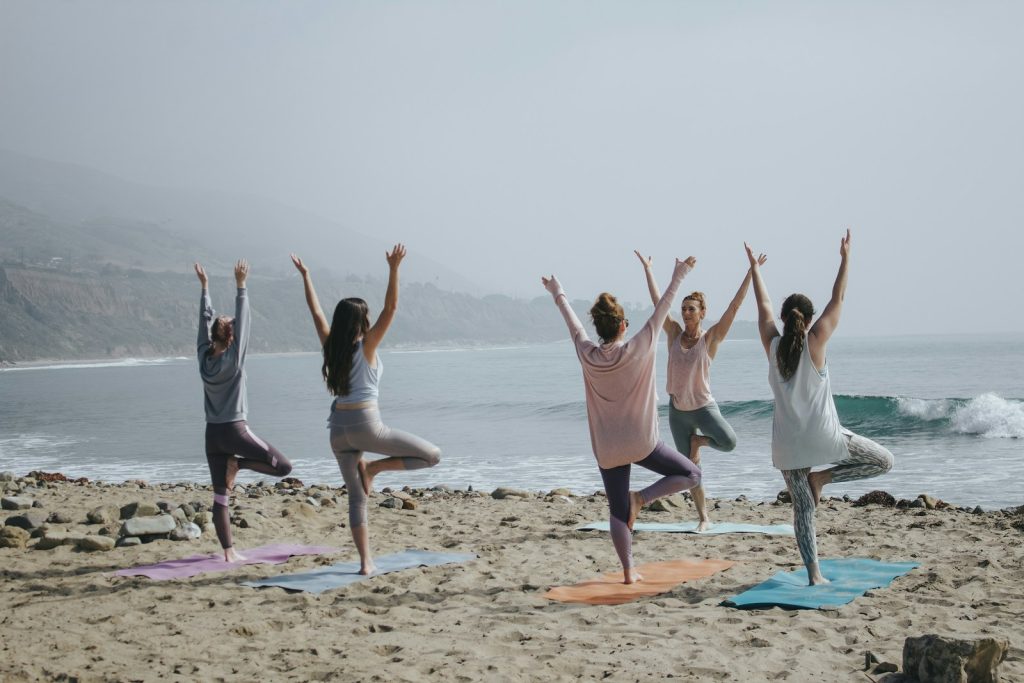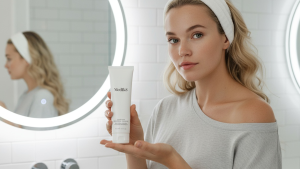Mental health is a crucial aspect of overall well-being, especially for women aged 35 to 55 who often juggle multiple roles and responsibilities. Incorporating regular exercise into your routine can significantly improve your mental health. Here are five exercises that can help, along with a bonus exercise to reduce stress.

1. Yoga
Yoga is a holistic practice that combines physical postures, breathing exercises, and meditation. It has been shown to reduce stress, anxiety, and depression while improving overall mental well-being.
Benefits:
- Enhances mood and emotional regulation
- Reduces symptoms of anxiety and depression
- Improves sleep quality
- Increases mindfulness and self-awareness
How to Get Started: Begin with simple poses like Child’s Pose, Downward-Facing Dog, and Cat-Cow. Gradually incorporate more challenging poses as you become comfortable. Aim for at least 20-30 minutes of yoga, three to four times a week.
2. Walking
Walking is a low-impact exercise that can be easily incorporated into your daily routine. It’s a great way to clear your mind, reduce stress, and boost your mood.
Benefits:
- Increases endorphin levels, which improve mood
- Reduces symptoms of anxiety and depression
- Enhances cognitive function and memory
- Provides an opportunity for social interaction if done with friends or family
How to Get Started: Start with a 10-15 minute walk around your neighbourhood or local park. Gradually increase the duration and intensity. Aim for at least 30 minutes of walking, five days a week.

3. Strength Training
Strength training involves using resistance to build muscle strength and endurance. It’s not only beneficial for physical health but also has significant mental health benefits.
Benefits:
- Boosts self-esteem and confidence
- Reduces symptoms of anxiety and depression
- Improves sleep quality
- Enhances cognitive function
How to Get Started: Begin with bodyweight exercises like squats, lunges, and push-ups. As you become more comfortable, incorporate weights or resistance bands. Aim for two to three strength training sessions per week, focusing on different muscle groups each time.
4. Dancing
Dancing is a fun and expressive way to improve your mental health. It combines physical activity with music, which can be incredibly uplifting and stress-relieving.
Benefits:
- Increases endorphin levels, improving mood
- Reduces stress and anxiety
- Enhances social interaction and connection
- Boosts self-expression and creativity
How to Get Started: Join a dance class or follow online dance tutorials. Choose a style of dance that you enjoy, whether it’s salsa, hip-hop, or ballroom. Aim for at least 30 minutes of dancing, three times a week.
5. Mindfulness Meditation
Mindfulness meditation involves focusing on the present moment and accepting it without judgment. It’s a powerful tool for reducing stress and improving mental clarity.
Benefits:
- Reduces symptoms of anxiety and depression
- Enhances emotional regulation and resilience
- Improves focus and concentration
- Increases self-awareness and mindfulness
How to Get Started: Find a quiet space and sit comfortably. Close your eyes and focus on your breath. If your mind wanders, gently bring your attention back to your breath. Start with 5-10 minutes of meditation daily and gradually increase the duration.

Bonus Exercise: Progressive Muscle Relaxation (PMR)
Progressive Muscle Relaxation is a technique that involves tensing and then relaxing different muscle groups in the body. It’s an effective way to reduce stress and promote relaxation.
Benefits:
- Reduces physical tension and stress
- Enhances relaxation and calmness
- Improves sleep quality
- Increases body awareness
How to Get Started: Find a comfortable position and close your eyes. Start with your toes and work your way up to your head, tensing each muscle group for 5-10 seconds and then relaxing for 15-20 seconds. Practice PMR for 10-15 minutes daily, especially before bedtime.
Conclusion
Incorporating these exercises into your routine can significantly improve your mental health. Remember, the key is consistency and finding activities that you enjoy. By taking care of your mental health, you can lead a happier, healthier, more fulfilling life.













